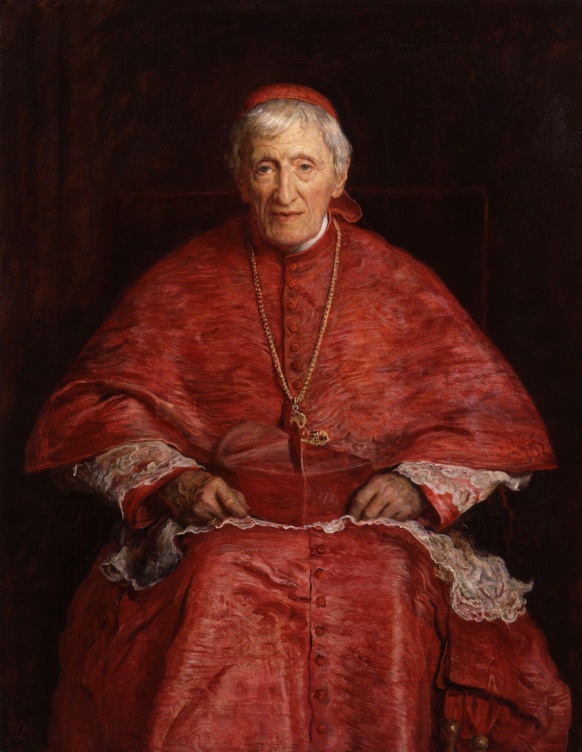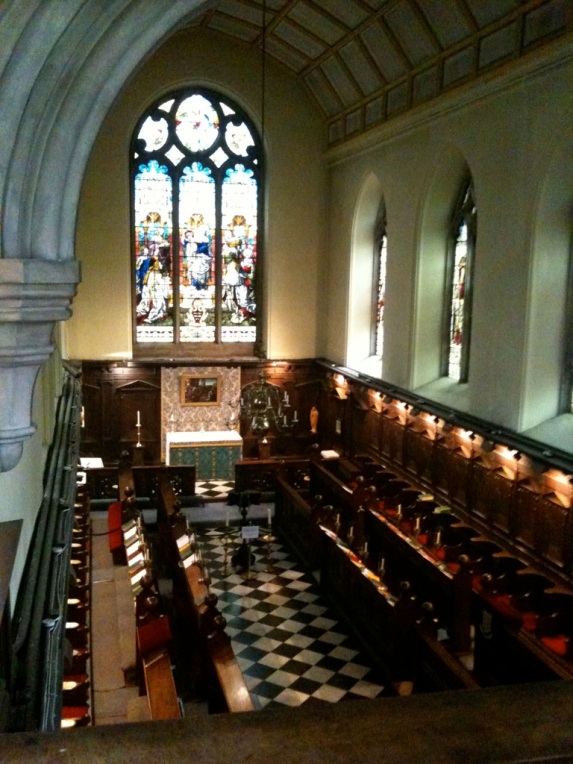- A Meditation For Ash Wednesday – How This Impacts Us at Pontifex University.
- Bishop Conley writes?
The Palazzo di Propaganda Fide sits at the south end of the Piazza de Spagna in Rome. The building has housed the Vatican’s offices for evangelization around the world since the 17th century. It is a beautiful baroque building, designed by the great Gian Lorenzo Bernini, and designed to evoke the Church’s mission to proclaim the Gospel to every human heart, to every people, to every nation.
In 1847, Blessed John Henry Newman, was ordained a Catholic priest in a small chapel just off the entrance of the Palazza di Propaganda Fide. The next day, he celebrated his first Mass in another small chapel, on the second floor, overlooking the street. It is a beautiful symbol that Newman was ordained a priest in this building: as a famous convert to Catholicism, he represents the Church’s mission of evangelization, and, as a Catholic priest, he was responsible for the evangelization of hundreds of souls. In the 19th century, England was considered, once again, to be missionary territory and Newman would return to England as a Catholic priest of the Oratory of St. Philip Neri, to bring souls back to Holy Mother Church.
I had the privilege of celebrating Mass last week at the altar where Newman offered his first Mass. Several priests of the Diocese of Lincoln joined me, and our Lincoln seminarians who are studying at the North American College in Rome served the Mass. It was a moment of joy for me, and also a moment of humility. I was reminded, in that Mass, of the great responsibility each one of us carries: to proclaim the Gospel, to witness to truth, to know, love, and serve the Lord such that others will take up the mission of doing the same.
This week, we begin the holy and penitential season of Lent; a season designed to help us remember the mission of the Christian life, and to recommit ourselves to serving the Lord and his Kingdom. The wisdom of Blessed John Henry Newman can offer us important guidance this Lent.
“At Christmas,” Newman once wrote, “we are born again with Christ [in baptism]; at Easter we keep the Eucharistic Feast. In Lent, by penance, we join the two great sacraments together.” Lent is the time, Newman taught, in which we might do penance, asking the Lord for forgiveness for our sins against the grace of baptism, so that we might receive the Eucharist more worthily.
To have a fruitful Lent, Newman taught, we should examine our hearts and consciences, to be honest about the places in our lives where sinfulness abounds. And then we should offer penances and sacrifices, mortifications and fasts, to be freed of those sins, to bring ourselves more humbly and honestly seek God’s mercy.
Newman taught that Lent should be the time in which we remember that we will face judgment, and that nothing in this life is worth losing eternal happiness with God. He said that Lent is a time to give up some of the comforts of our lives, so that our comforts and luxuries won’t lead us into sin. “Let not the year go round and round, without a break and interruption in its circle of pleasures,” he wrote. “Give back some of God’s gifts to God, that you may safely enjoy the rest. Fast, or watch, or abound in alms, or be instant in prayer, or deny yourselves society, or pleasant books, or easy clothing, or take on some irksome task or employment; do one or other, or some, or all of these, unless you say that you have never sinned… Ever bear in mind that Day which will reveal all things, and will test all things ‘so as by fire,’ and which will bring us into judgment ere it lodges us in heaven.”
Finally, Newman taught that during Lent, especially, we should pray for one another. Newman believed that intercessory prayer was a fundamental obligation of Christians, especially during Lent. Newman wrote that “the privilege of Intercession is a trust committed to all Christians who have a clear conscience and are in full communion with the Church.” He kept long lists of people to pray for, and committed to asking the Lord for specific things for each one of them. During Lent, he spent as much time as he could praying for others.
The lessons of Newman for Lent are simple: each one of us will be judged someday, and we should act accordingly. During Lent, we should confess our sins, so that we can live out our baptism more fully, and receive the Eucharist more worthily.
During Lent, we should give up some of our comforts, and take up some acts of charity, so that our comfortable lives don’t distract us from our Christian mission, or lead us into sin.
During Lent, we should spend as much time as we can in prayer for other people, asking the Lord to grace them in real and particular ways. During Lent we should try to spend more time in quiet prayer before our Eucharistic Lord in adoration.
Newman’s lessons can instruct us this Lent to become more holy, as he was holy. My prayer is that each one of us will grow closer to the Lord during these hallowed weeks of Lent; that all of us will become holier through our Lenten practice, because God made each one of us for holiness. And I pray that the lessons of Blessed John Henry Newman will be helpful to you during this holy season of Lent.
This article first appeared in the the Southern Nebraska Register.

Afterword by David Clayton:
Newman, one of the great Catholic thinkers of the 19th century is one of the people whose writing inspired the ethos that shaped Pontifex University. His Idea of a University has become almost mandatory reading for anyone who is interested in educating Catholics today to engage constructively with the modern world. It is for this reason that so many Catholic chaplaincies at American universities are called Newman Centers. Bishop Conley has done much to make the University of Lincoln’s Newman Center a place of beauty and a place of beautiful liturgy that draws us in to drink from the source of the flowing waters so that we might benefirt from that which all Catholic education is forming us for – an encounter with God in the Eucharist. For those who cooperate with God’s grace this is the source of divine wisdom and supernatural transformation in Christ that equips us for and guides us to our personal vocation in this life and the next. It is what every student clamours for, if they are honest, and so few realise where it is offered to them. It is through the beauty of St Thomas Aquinas Catholic Church at the Newman Center in the University of Nebraska-Lincoln that this truth is communicated to them.
In my book, the Way of Beauty, I quote Newman who describes his time at Oxford as a young student in the early 18th century. He describes how in his opinion, the tutorials, lectures, exams and books (however great) were not the most important aspect of an education. He says that the educational community is the most powerful forming influence in the young men of Oxford. In short, the students teach each other and form their characters, for good or ill.
The question then is how do you create community? The answer, in my opinion, is most powerfully, the prayer of community, which is a liturgically oriented piety. The Oxford college that Newman attended was Oriel. The Liturgy of the Hours, in the form of the Anglican Office would have been prayed daily in those days and will still be prayed regularly today. It is no accident that the place that formed one of the great intellects of the post-Enlightenment Church should have worshipped in a place of such beauty. How much more if Mass were celebrated here too.

Pontifex University offers online classes. How, one might ask can we build community? Well it is more difficult but it is possible. The answer is that we build community through personal communication, of course, and all other practial ways we can think of. But also we create one that is mediated by the Church through prayer. This is why we encourage all Pontifex students to develop a liturgically oriented piety and also to pray for each other and for us.
And this brings us back to the Bishop’s Ash Wednesday message. We will pray for you and we ask that you pray for us, that we may all participate in a community that might contribute steadily more to the common good and the greater glory of God.
I would encourage all to visit the website of the Southern Nebraska Register. This is the newspaper for the Diocese of Lincoln, Nebraska. Bishop James Conley, the Bishop of Lincoln, contributes regularly and his writings are worthy of study. He has a strong interest in the connection between the practice of the Faith, with the worship of God in the sacred liturgy at its heart, and its impact on every aspect of the culture. This is further indicated by the beautiful new church at the Newman Center at the University of Nebraska and the Great Books programs that he has intiated at the Newman Institute there and which focus on the how the beauty of a Christian culture draws us to the Faith.
